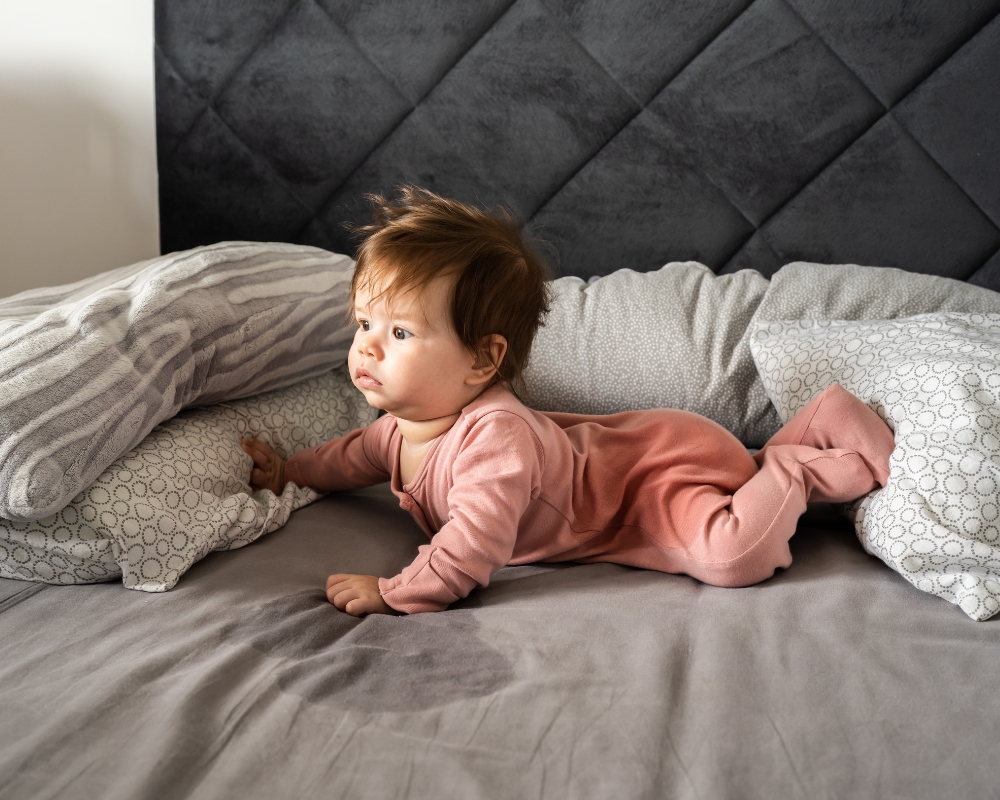As a parent, it’s natural to be concerned when your little one goes through phases like bedwetting. It can often feel an uphill battle as you don’t know how long the issue will last and what may cause another incident.
What is bedwetting?
Bedwetting, also known as nocturnal enuresis, is a common issue that affects many children. It occurs when a child involuntarily urinates during sleep, often after the age of 5 when they should have already learned to control their bladder. An 8-year study* revealed that 15% of children above the age of 5 years suffer from blader control issues. While it can be a frustrating and embarrassing experience for both the child and their parents, it is important to remember that bedwetting is a normal part of development and usually resolves on its own. In this article, I will discuss the causes of bedwetting, how it can be managed, and when to seek medical advice.
Bedwetting Causes
Bedwetting can have several underlying causes, including:
- Developmental Delay: Some children may have difficulty learning to control their bladder at night due to a developmental delay.
- Genetics: Bedwetting often runs in families and may be passed down through genetics.
- Small Bladder Capacity: A child with a small bladder may not be able to hold enough urine during the night, resulting in bedwetting.
- Hormonal Imbalance: In some cases, a hormonal imbalance may cause a child to produce more urine during the night than their bladder can hold.
- Urinary Tract Infections: Bedwetting can also be a symptom of a urinary tract infection.
Psychological Causes
- Psychological factors can also play a role in bedwetting in some cases. Here are some ways that psychological factors may affect bedwetting:
- Stress and anxiety: Stressful events, such as moving to a new home, starting a new school, or experiencing family conflict, can trigger bedwetting in some children. Anxiety can also play a role, as it can cause a child to be overly worried about wetting the bed and lead to a cycle of bedwetting.
- Behavioral issues: Children who have behavioral issues such as hyperactivity or attention-deficit/hyperactivity disorder (ADHD) may be more prone to bedwetting. These conditions can cause the child to have difficulty controlling their bladder or wake up during the night to use the bathroom.
- Emotional factors: Emotional factors, such as low self-esteem, poor body image, or feeling depressed, can contribute to bedwetting. Children who struggle with emotional issues may be more likely to wet the bed, as they may be less motivated to get up and use the bathroom during the night.
- Trauma: In some cases, bedwetting may be related to trauma, such as abuse or neglect. Trauma can cause anxiety and emotional distress, which can contribute to bedwetting.
Bedwetting Treatment
If your child is experiencing bedwetting, there are several steps you can take to help manage the problem:
Are you looking for some real help to tackle bedwetting with your little one? If so, the first step is understanding that this issue can be effectively managed; there are certain steps you can take which could make a world of difference.
- Encourage Good Sleep Habits: Make sure your child is getting enough sleep and is going to bed at a consistent time each night.
- Limit Fluid Intake: Limiting your child’s fluid intake in the hours leading up to bedtime can help reduce the likelihood of bedwetting.
- Encourage Toilet Use: Encourage your child to use the toilet before going to bed. Install night lights in the hallway and bathroom to make it easier for your child to find the restroom
- Use Protective Bedding: Consider using waterproof bedding or protective underwear to help minimise the mess from bedwetting.
- Positive Reinforcement: Offer praise and positive reinforcement for dry nights to help encourage your child. Keep track of your child’s progress by creating a chart and rewarding them when they remain dry. Agree on the rewards beforehand.
- Avoid using diapers or training pants at home, particularly if your child is over 8 years old. They can still use them when staying over at family or friends’ houses.
- Involve your child in cleaning up in the morning, such as removing wet sheets or assisting with laundry.
- Consider using a bedwetting alarm that has special sensors and goes off when the child wets the bed. These alarms are most effective for children aged 6 and above. Speak to the Dr. Helena Taylor’s paediatric team about the most appropriate type of alarm and how to use it.
Your dedication to helping your child tackle bedwetting is just as important, if not more so, than their own commitment. Working together comes with the promise of achieving a rewarding result: say goodbye to those night-time accidents and hello to peaceful slumber!
When to seek medical advice?
In most cases, bedwetting is a normal part of development and will resolve on its own over time. However, there are some cases where you should seek medical advice:
- Bedwetting persists beyond the age of 7-8 years.
- Your child is experiencing other symptoms, such as painful urination or frequent urination.
- Your child has suddenly started bedwetting after a period of being dry at night.
- Your child is experiencing emotional distress or social problems as a result of their bedwetting.If you are concerned about your child’s bedwetting, speak to our paediatric team at Dr. Helena Taylor clinic. We can help determine if there is an underlying medical condition that needs to be addressed.
At our Dr. Helena Taylor clinic, we understand that bedwetting can be frustrating and embarrassing experience for both kids and parents. That’s why we have a dedicated multidisciplinary team to help kids overcome this challenge. Our team includes a paediatrician who can provide medical guidance and support, A physiotherapist who can help with pelvic floor muscle training and other medical and psychological professionals who can provide additional support as needed. With our multidisciplinary approach we can help your child achieve dry nights and improve their overall quality of life for the whole family.
References
*Fergusson DM, Horwood LJ, Shannon FT. Factors related to the age of attainment of nocturnal bladder control: an 8-year longitudinal study. Paediatrics. 1986 Nov;78(5):884-90. PMID: 3763302.
Schmitt BD.. Bed-Wetting (Enuresis). In: Instructions for Paediatric Patients, Saunders, 1999. p.209.
Caldwell PH, Nankivell G, Sureshkumar P. Simple behavioural interventions for nocturnal enuresis in children. Cochrane Database Syst Rev 2013; :CD00363
Caldwell PH, Codarini M, Stewart F, et al. Alarm interventions for nocturnal enuresis in children. Cochrane Database Syst Rev 2020; 5:CD002911.
Glazener CM, Evans JH. Desmopressin for nocturnal enuresis in children. Cochrane Database Syst Rev 2002; :CD002112.
Huang T, Shu X, Huang YS, Cheuk DK. Complementary and miscellaneous interventions for nocturnal enuresis in children. Cochrane Database Syst Rev 2011; :CD005230.
Peng CC, Yang SS, Austin PF, Chang SJ. Systematic Review and Meta-analysis of Alarm versus Desmopressin Therapy for Paediatric Monosymptomatic Enuresis. Sci Rep 2018; 8:16755.
Collis D, Kennedy-Behr A, Kearney L. The impact of bowel and bladder problems on children’s quality of life and their parents: A scoping review. Child Care Health Dev 2019; 45:1.







